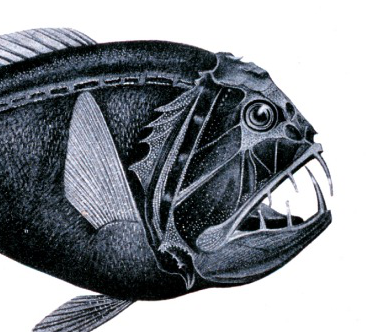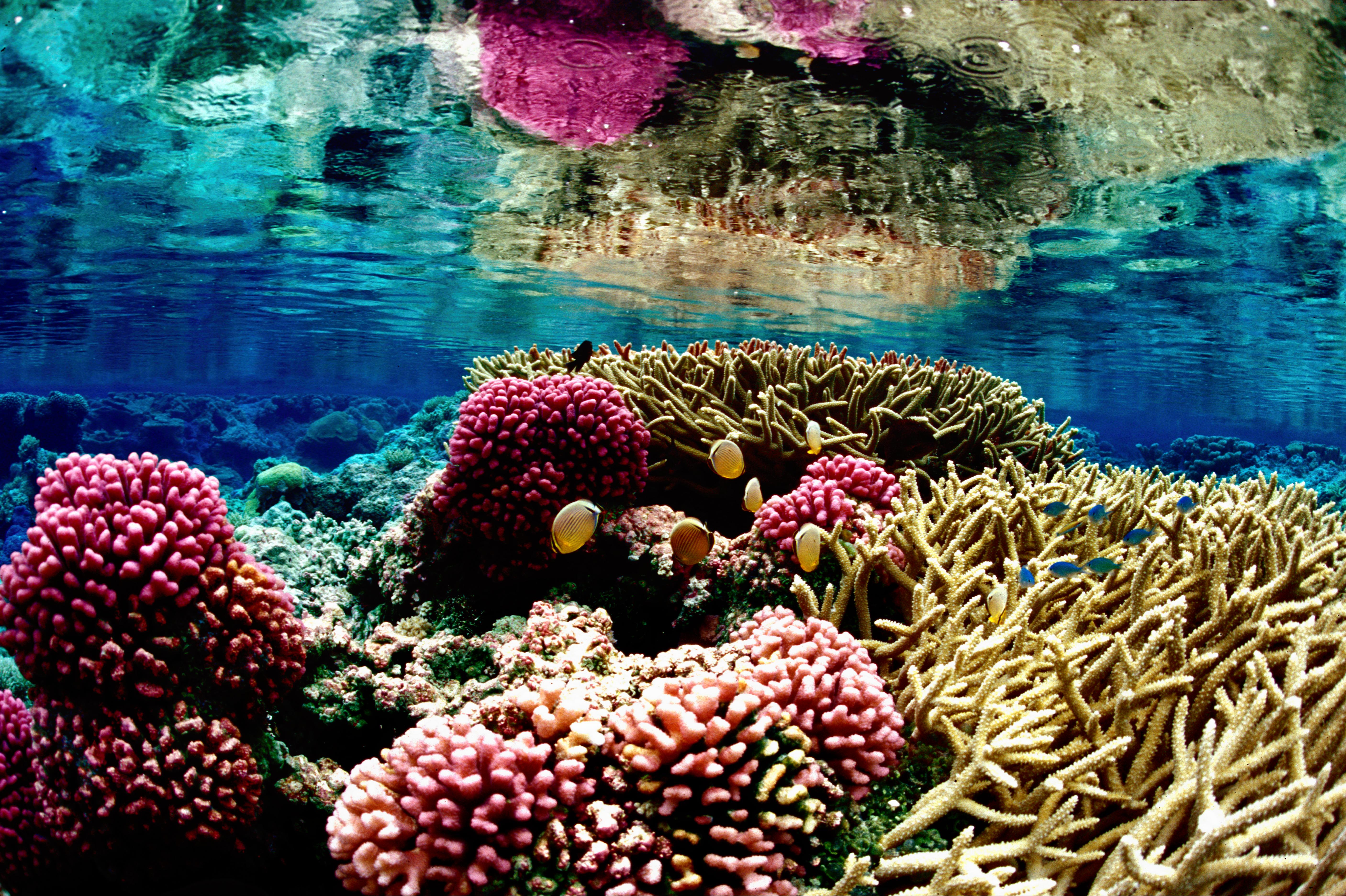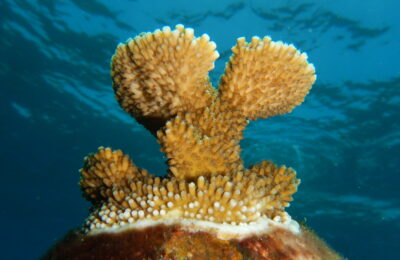Article: Lecchini et al. 2018. Boat noise prevents soundscape-based habitat selection by coral planulae. Scientific Reports 8:9283. DOI: 10.1038/s41598-018-27674-w.
We’ve all had those moments where we find it impossible to cut through all the noise and focus on what’s important, right? Whether it’s trying to study over the sound of a neighbor’s music or attempting to work while someone’s car alarm is going off, it is easy to get lost in the sounds that surround us. Well, we’re not the only ones who have this problem. Noise pollution affects a growing list of wildlife (from tree frogs to whales to song birds) and has the capacity to disrupt some of their vital behaviors and thereby ecosystem functions. New on this list may be corals at the planular (larval) stage. A new study by Dr. David Lecchini and his collaborators from around the world suggests boat noise masks other cues the coral planulae use to find a good place to settle.
But first, some background…
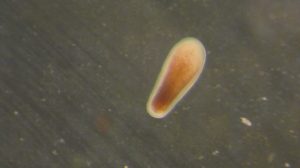
Corals are broadcast spawners, releasing eggs and sperm into the waters surrounding them. Fertilized eggs become planulae which then use a number of cues to choose where to settle before entering the polyp, and reef-building, phase. Planulae respond to light, pressure/depth, color, and chemicals in the water and can be influenced by other bottom dwellers. For many coral species, crustose coralline algae (CCA) mark attractive home building sites. Turf algae, cyanobacteria, and macroalgae are a deterrent to the settling planula. However, it is unknown whether coral planulae can detect sound. Strictly speaking, they lack ears; however, they are covered with cilia (tiny hairlike structures) that could grant them the ability to sense sound fields in the water. If that is the case, the soundscapes of healthy and degraded reefs could influence their settlement. Planular behavior during the settlement phase is coupled with coral populations’ persistence via replenishment. Stressors that impede planulae from selecting favorable habitats could impair reef recovery and resilience.
Along some reefs, the noise of boat traffic is increasingly being added to the natural sounds of reefs (waves breaking, the sounds of fish grunting and eating, and snapping shrimp, among others). Anthropogenic (human-created) noise is an acknowledged source of pollution and affects the behavior and even physiology of marine organisms. Therefore, Lecchini and colleagues set out to answer several questions:
- Do coral planulae exhibit phonotaxis (movement toward/away from a sound source) in different reef conditions?
- Does boat noise affect substrate preference of coral planulae?
What did the researchers do?
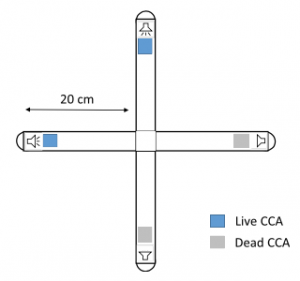
Researchers used planulae from two species of coral, Pocillopora damicornis and Acropora cytherea, and several pieces of CCA (Porolithon onkodes) collected from reefs and held in aquaria. Some CCA was bleached to obtain dead CCA for the substrate control. They recorded the sounds of reefs from three Marine Protected Areas (MPAs), three sites adjacent but outside of the MPAs, as well as repeated boat passes. They then performed a series of choice experiments using cross-shaped chambers. Two of the chamber arms ended with dead CCA and had no sounds playing. The other two included live CCA and working speakers at the ends, playing one of four sound treatments: 1) no sound (control), 2) MPA sound recording, 3) non-MPA sound recording, 4) boat noise recording. 40 planulae of one of the coral species were tested at a time and the number in each arm were counted every hour for 4 hours. The research team then analyzed the data to determine what, if any, preference was shown by the coral planulae.
What they found is pretty interesting
The sound samples they recorded did show differences among treatments. And these differences did influence the coral planulae.
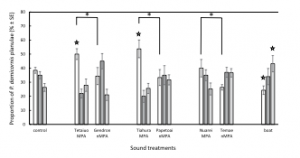
Pocillopora damicornis planulae preferred live CCA in the absence of any sound, with about 40% choosing live CCA, 25% dead CCA, and the remainder making no choice. Sound did affect choice, with MPA sounds increasing the proportion of planulae choosing live CCA to 50%. When boat noise was played, this pattern was essentially reversed: more planulae chose the dead CCA (about 45%) than the live CCA (about 25%).
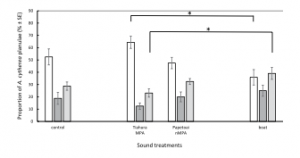
Fewer experiments were conducted with Acropora cytherea planulae; however, a similar but possibly more pronounced pattern emerged. With no noise, over 50% of planulae chose live CCA while about 30% chose dead CCA. When MPA sounds were played behind the live CCA, about 65% of planulae chose live CCA. That number dropped to about 36% when boat noise was played, with the majority choosing dead CCA in that treatment.
What does this tell us?
Planulae of both species of coral prefer live CCA based on chemical cues, based on the control (no sound) treatment. And the researchers did indeed find that the planulae were affected by soundscapes – MPA sounds enhanced and boat noise reduced the propensity of the planulae to settle on live CCA .
Why is this important?
Lecchini’s study identified a previously unknown cue that coral planulae are capable of using to select a settlement habitat. There is always value in new information and scientific discovery (plus, it’s pretty cool!). Coral planulae are phonotaxic! But, as is often the case, the experiment raises more questions than it answers. For example, how do coral planulae detect and experience soundscapes? And how far from the sound source can they detect sounds? Do the planulae prefer dead CCA when boat noise is played because they are avoiding the sound of boats or because that sound impairs their ability to detect other stimuli? There are tons of possibilities to explore!
More broadly, this research identifies another potential hazard for coral reefs, which are threatened worldwide. Boat noise has now joined the ranks of climate change—bleaching events and associated ocean acidification–, physical damage from hurricanes, anchors and divers, chemicals including certain sunscreens, pollution…the list goes on and on. But boat noise is a unique stressor that impedes planulae from selecting favorable habitats, potentially impairing reef recovery and resilience. It may be beneficial to manage boat traffic over coral reef systems, especially during recruitment periods when planulae choose their settlement substrates. Such restrictions may increase the chances of planulae choosing substrates that would benefit their survival. As boat traffic noise increases worldwide, this issue could become increasingly important.
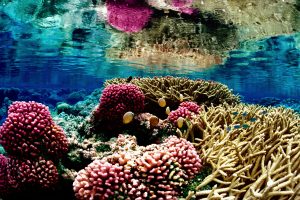
I am a graduate of the University of Notre Dame (B.S.) and the University of Rhode Island (M.S.). I now work in southwest Florida, contributing to the management of an estuary. I am fascinated by the wonders of nature, the land-sea interface, ecology and human disturbance (and solutions!). On a personal level, I am a chocoholic, love to travel and be outside, and relax by reading or spending time with my emotionally needy dogs!
